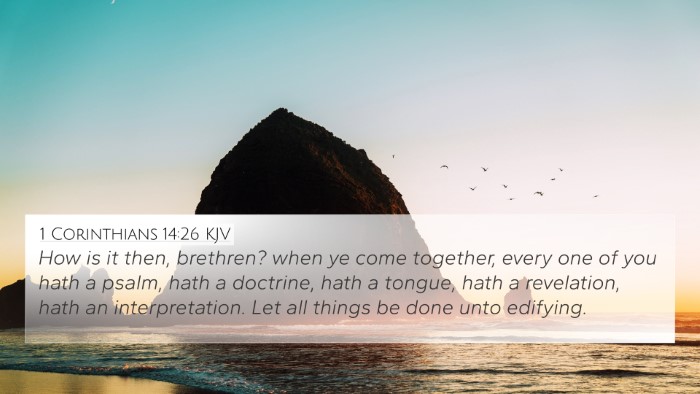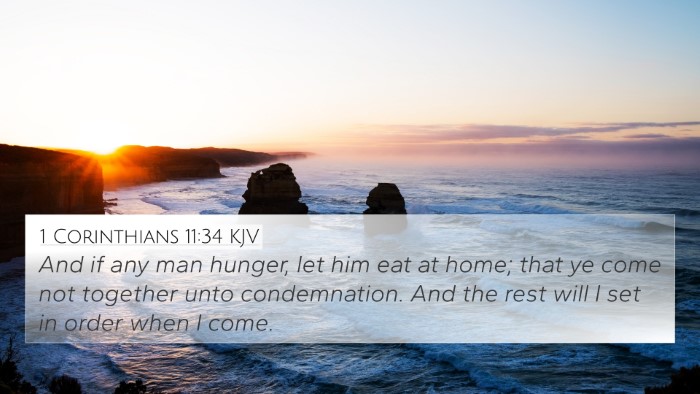Understanding 1 Corinthians 14:40
Bible Verse: “Let all things be done decently and in order.” - 1 Corinthians 14:40
Meaning and Interpretation
In this verse, the Apostle Paul emphasizes the significance of order and decorum within the worship and functioning of the church. Throughout his letters, Paul addresses various issues regarding worship practices and the use of spiritual gifts, highlighting the necessity of maintaining a structure that fosters clarity and edification among believers.
Insights from Public Domain Commentaries
-
Matthew Henry:
Henry stresses that Paul’s directive relates to the common practices in public worship. He argues that God, being a God of order, seeks that our acts of worship be characterized by peace rather than chaos. Disorder can lead to confusion and misunderstanding among the congregation.
-
Albert Barnes:
Barnes notes that this verse serves as a conclusion to Paul’s discourse on the use of spiritual gifts in a communal setting. He points out the importance of propriety in worship, which reflects God’s nature. This verse extends an invitation to believers to actively ensure that all church activities promote understanding and unity.
-
Adam Clarke:
Clarke elaborates on the idea of “decently and in order,” suggesting that this serves both as a principle for worship and a guideline for governance within the church. He reflects on the broader implications of this orderliness, which should permeate all aspects of church life and should be a testament to God’s nature.
Related Bible Verses
This verse has several connections and parallels across Scriptures that further illuminate its meaning. Here are some relevant cross-references:
- 1 Corinthians 14:33: “For God is not the author of confusion, but of peace, as in all churches of the saints.” - This verse directly supports Paul's exhortation about order in worship.
- 1 Timothy 2:1-2: “I exhort therefore, that, first of all, supplications, prayers, intercessions, and giving of thanks, be made for all men; for kings, and for all that are in authority; that we may lead a quiet and peaceable life in all godliness and honesty.” - Demonstrating the theme of order and respect within community dynamics.
- Colossians 3:23-24: “And whatsoever ye do, do it heartily, as to the Lord, and not unto men; knowing that of the Lord ye shall receive the reward of the inheritance: for ye serve the Lord Christ.” - Encourages believers to perform all actions with dedication and order.
- Romans 12:1-2: “I beseech you therefore, brethren, by the mercies of God, that ye present your bodies a living sacrifice, holy, acceptable unto God, which is your reasonable service.” - Offers groundwork for living an ordered life in service to God.
- Philippians 4:5: “Let your moderation be known unto all men. The Lord is at hand.” - Ties in with a principle of decorum and reasonableness in all our dealings.
- 1 Peter 5:2-3: “Feed the flock of God which is among you, taking the oversight thereof, not by constraint, but willingly; not for filthy lucre, but of a ready mind; neither as being lords over God’s heritage, but being ensamples to the flock.” - Addressing the leadership aspect in maintaining orderliness.
- Hebrews 10:24-25: “And let us consider one another to provoke unto love and to good works: not forsaking the assembling of ourselves together, as the manner of some is; but exhorting one another: and so much the more, as ye see the day approaching.” - Encouraging believers to gather and act in a structured manner that promotes encouragement and growth.
Thematic Connections
This verse embodies a broader Biblical theme that underscores the importance of order, respect, and love in all aspects of life. As believers explore the themes of unity and peace, it is clear that Paul’s instruction serves as a necessary reminder of God’s desire for harmony in community gatherings.
Inter-Biblical Dialogue
Linking 1 Corinthians 14:40 to other passages can illustrate a rich tapestry of inter-Biblical conversation that reinforces the idea of order and decorum throughout Scriptures:
- Identifying connections between Old and New Testament: Psalms often reflect a reverent approach to worship, which can be seen in the structured approach to Old Testament temple worship.
- Comparative study of Pauline epistles: The theme of order is echoed in other letters where Paul addresses church conduct, such as in Ephesians 4:3 where he speaks about endeavoring to maintain the unity of the Spirit.
- Cross-referencing Psalms with New Testament teachings: The Psalms reflect a deep sense of reverence and order, which complements Paul's urging in Corinthians for churches to approach worship with the same respect.
- Detailed cross-reference between Gospels: The Gospels reflect Jesus's own teachings on order and perspective in religious duties, emphasizing that God is pleased when worship is conducted properly.
Tools for Further Study
For those interested in exploring the themes presented in this verse further, several resources may aid in your cross-referencing and study:
- Bible concordance - An invaluable tool for finding terms and phrases across the Scriptures.
- Bible cross-reference guide - Helps in identifying related verses for deeper study.
- Cross-reference Bible study methods - Various approaches to engaging with scriptural texts.
- Bible reference resources - Provides context and historical background for better understanding.
- Bible chain references - A method of following themes through connected verses.
Conclusion
In conclusion, 1 Corinthians 14:40 serves as a powerful reminder of the importance of order and decorum within the church. Understanding and applying this teaching enriches communal worship and cultivates a spirit of unity among believers. The cross-references and commentary insights provide a deeper understanding of how this principle is woven throughout the entirety of Scripture. By embracing this instruction, believers can foster an environment that honors God and encourages spiritual growth.







